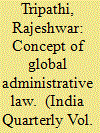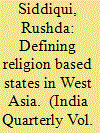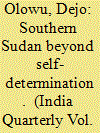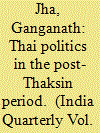|
|
|
Sort Order |
|
|
|
Items / Page
|
|
|
|
|
|
|
| Srl | Item |
| 1 |
ID:
109035


|
|
|
|
|
| Publication |
2011.
|
| Summary/Abstract |
While there has been much discussion in international disaster management literature in recent years of the need to give affected communities much more 'ownership' of recovery and rehabilitation pro-jects and programs, there is little real understanding of what this might mean in practice. There are many calls for post-disaster recovery programs to reduce vulnerability to future risks, or to 'build back better'. Drawing from an intense study of social recovery and community rebuilding across five tsunami-affected local areas in Sri Lanka and southern India, this article affirms the need for greater community 'guidance' of disaster recovery but it argues that different forms of community engagement are required for different stages in the long process from relief to recovery. It argues that 'build back better' is possible, but only if aid and other related agencies work more closely with existing capacities for resilience within the affected communities and contribute towards their legitimacy.
|
|
|
|
|
|
|
|
|
|
|
|
|
|
|
|
| 2 |
ID:
109038


|
|
|
|
|
| Publication |
2011.
|
| Summary/Abstract |
Globalisation, which has integrated the whole world into a unit by a vast range of regulatory regime, has led to the emergence of a global state through international institutions. These institutions regulate the social, economic and political life of states. Therefore it has led to the emergence of the concept of Global Governance. This concept of Global Governance has led to development of the concept of Global Administrative Law (GAL). This GAL concept is based on the idea of understanding global governance as administration, which can be organised and shaped by principles of an administrative law character. In this way GAL is related to trans-governmental regulation and administration designed to address the consequences of globalised interdependence in such fields as security, trade conditions on development and financial assistance, banking and financial regulations, Intellectual Property Rights, Labour standards and cross-border movements of populations, including refugees. Isolated national regulations cannot govern these different areas and administrative measures and therefore various transnational systems of regulation or regulatory co-operation have been established through international treaties and organisations. To implement these regulations, transnational administrative bodies-including international organisations and informal groups of officials that perform administrative functions, are established. However these institutions are not directly subject to control by national governments or domestic legal systems or, in the case of treaty-based regimes, the states party to the treaty. However their regulatory decisions may be implemented directly against private parties by the global regime or more commonly through implementing measures at the national level. This situation has led to the question of accountability, fairness and transparency and due process in the functioning of these bodies. GAL is developed in response to this question, which attempts to extend the application of domestic administrative law to intergovernmental regulatory decisions that affect a nation.
|
|
|
|
|
|
|
|
|
|
|
|
|
|
|
|
| 3 |
ID:
109037


|
|
|
|
|
| Publication |
2011.
|
| Summary/Abstract |
As speculation grows about the possibility of a turbulent Egypt, Libya, Tunisia or even Algeria drifting from demanding democracy and political liberalism to establishing an Islamic state, this article, by attempting to define religion based states would want to form a background to the speculations. The author would like to point out that the coming power by a political party with a religious affiliation would not make the states into Islamic States. As a matter of fact, given the kind of external and internal forces at play in West Asia and North Africa, it would not be possible for any country to redefine the basis of its identity, let alone transform itself into a theocratic state in classical parlance. With the close of the Second World War and the establishment of nation-states in the new world order, two deviant states were created from Asia. Israel and Pakistan were created taking religion, instead of geography or history of the land or ethnicity or race or existing socio-political structures, for the foundational basis of their identity. It heralded a new era for history. These states were going to be yardsticks for later day religion based socio-political movements. If these movements were going to gain power, they would need to conform to the newly set patterns for religion based states. Re-creating a theocratic state based on classical historical lines, is no longer an option.
|
|
|
|
|
|
|
|
|
|
|
|
|
|
|
|
| 4 |
ID:
109033


|
|
|
|
|
| Publication |
2011.
|
| Summary/Abstract |
After decades of sanguineous struggle for political and economic self-determination, the peoples of South Sudan eventually voted en masse for the emergence of the newest African state: the Republic of Southern Sudan. Beyond the euphoria of national liberation, however, this article traces similar experi-ences in the assertion of self-determination and how their dynamics could relate to post-liberation Southern Sudan. It is argued that beneath the broadly unifying theme of 'national' resistance to northern oppression lies more complex and ongoing struggles over the ownership and control of core historical narratives, identities, symbols and resources. Despite the pervasive ambience of fear, scepticism and caution in which Southern Sudan will ultimately emerge as a full-fledged sovereign state in July 2011, this article highlights certain variables that could turn out to be the lessons for and from this embryonic state. While not failing to point to the inherent frailties of this new state, this article strongly canvasses the collaboration of internal and external forces in turning Southern Sudan's challenges and opportunities into veritable vehicles for making this entity a successful African story in post-independence nation-building and development as well as a unique contribution to self-determination discourses in an atmos-phere of sustainable peace and prosperity.
|
|
|
|
|
|
|
|
|
|
|
|
|
|
|
|
| 5 |
ID:
109036


|
|
|
|
|
| Publication |
2011.
|
| Summary/Abstract |
hailand has been witnessing political uncertainties ever since the ouster of Prime Minister Thaksin Shinawatra. Although the 1997 Constitution of Thailand was one of the best in terms of evolving democratic institutions and Thaksin was one of the most popular leaders, yet the system could not work. Thaksin was disliked by the traditionally entrenched elite who joined together to remove him arbitrarily from power in which the military and the Royal Privy Council took a prominent part. The system that was adopted under military rule did not like to retain the 1997 constitution but decided to replace them with a new constitution (2007), in which the interests of the military were protected and promoted. In the evolving permutations and combinations, two groups-Yellow Shirts and Red Shirts-have emerged to oppose each other, often violently, to offer thesis and anti-thesis for and against Thaksin and his brand of politics. This article has tried to understand the dynamics of power politics in Thailand, the rise of the Yellow Shirts and Red Shirts and the emerging problems that Thailand will have to address in the future.
|
|
|
|
|
|
|
|
|
|
|
|
|
|
|
|
|
|
|
|
|